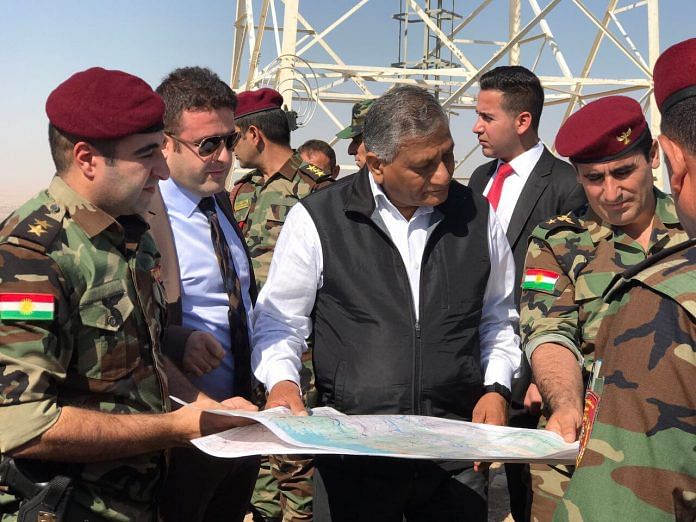While there is reason to believe that the 39 men who went missing in Mosul after IS seized control of the Iraqi city may not be alive, external affairs minister Sushma Swaraj has maintained they are. As her junior minister Gen. V. K. Singh arrives in the Kurdish city of Erbil to coordinate a search mission, the families of the men remain in the lurch.
For the families of the men who went missing in Mosul after the Islamic State (IS) seized control of the city in June 2014, each day since has been a test of their faith. But now, with Iraq’s prime minister declaring the city recaptured Monday and Minister of State General V. K. Singh arriving in the Kurdish city of Erbil to coordinate a search mission, these families believe their day of reckoning has finally arrived.
“V. K. Singh is in Iraq since Monday night. Any time now I will be getting a phone call that my husband has been found,” says Anita, resident of Hoshiarpur. Her husband Gurdeep Singh, 40, is among the 39 Indians who remain missing since their capture on June 10, 2014.
A majority of family members who spoke to ThePrint last heard from their captured relatives on June 15—no information on their status has emerged publicly since. Still, despite IS’ three-year reign of terror in Mosul, which they declared the ‘capital’ of their ‘caliphate,’ these families maintain that their men are alive.
“There is no internet there. That is why they could not contact us,” explains Shinder Pal of Selkiana, a village near Ludhiana. His elder brother, Balbir Chand, worked with a steel company in Mosul and was one of those captured three years ago.
Most of the Indian men who were captured worked for Baghdad-based construction company, Tariq Noor Al Huda, and 24 of them hailed from Punjab.
The families’ confidence stems largely from External Affairs Minister Sushma Swaraj’s consistent proclamations that her government had “information” that the kidnapped Indians were alive.
Manjit Singh of Amritsar, whose younger brother Malkeet Singh is missing, has complete faith in Swaraj’s proclamations. “We met Sushma Swaraj over ten times and she always says that she knows our men are safe. She is such a big minister in the government, how can the government be wrong? And what will she gain by giving us false hope?”
But despite the families’ optimism and the government’s assurances, others tend to believe Harjit Masih, a resident of Gurdaspur, who said he escaped IS detainment in Mosul after witnessing the other 39 captured Indians gunned down by masked militants four-days after being abducted. Masih said he escaped after being shot in the leg by feigning dead and made his way back to safety. But, upon his return to India, Masih claimed the GoI kept him underground for months due to fear of public backlash.
Sushma Swaraj has vehemently denied Masih’s reports and promised the GoI will continue its search. Families of the captured men tend to agree with her dismissal.
“I know [Masih]. He was related to the agent who had sent most of our men there. I don’t know how he came back but he is not telling the truth,” said Kanwaljit Kaur, mother of the missing Dharminder Kumar. “He says everyone was killed on June 15 but some of the families received phone calls from the men even after that,” she said.
ThePrint was unable to confirm that these phone calls after June 15 took place.
V. K. Singh now carries the burden of Swaraj’s promises as he coordinates the search. But these families are slowly beginning to lose patience.
“[V. K. Singh] has already been there for two days now,” says Mahinder Kaur of Batala, mother of the captured Kanwaljt Singh. “Why has no information of what he is doing been shared with us?”
As time passes, at least some families have come around to the idea that Masih’s account might be, at least partially, accurate and their family members might have been killed.
“I have 80 per cent faith in Masih and only 20 per cent faith in the government,” said Parvinder Singh, resident of Hoshiarpur, whose brother and two brother-in laws are missing.
Speaking over the phone from Abu Dhabi, Singh said that, despite his pessimism, he had requested a visa to search for his relatives.
“I worked in Mosul for almost one year before I called the others there,” he said. “I want to do something more than just sitting around and waiting. You have no idea how it feels to have called every young male member of my family to that country and then lose them.”



